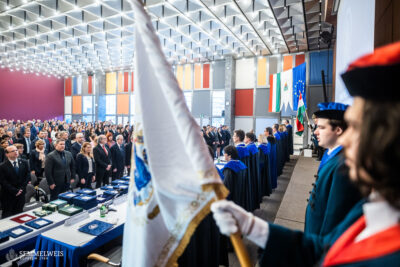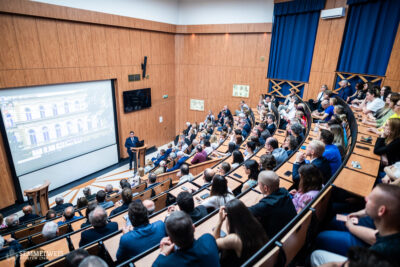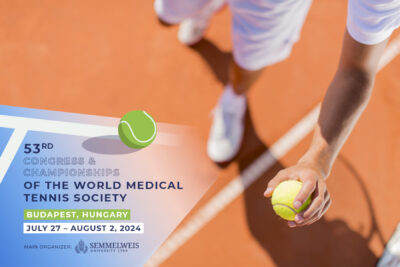Dr. Miklós Szócska, vice-dean of the Faculty of Health and Public Administration and director of the Health Services Management Training Centre has recently been nominated by the Hungarian Government for the position of WHO Director-General. Altogether there are six candidates for this position. In his programme “Better health and stronger WHO” Dr. Szócska emphasizes, among other things, that health should be handled as a top priority at global level. We had the opportunity to take an interview with Dr. Szócska following his introduction at the WHO Western Pacific Committee meeting in Manila and before the audition to be held in Geneva at the beginning of November with the participation of WHO member states. Dr. Szócska also presented his programme in the framework of an interactive consultation at Semmelweis University, which was officially opened by Dr. Ágoston Szél rector and moderated by Dr. Miklós Réthelyi rector emeritus.
This recently elaborated programme points on the topics such as the fight against epidemics, the improvement of health and health-consciousness globally, the recognition, acceptance and implementation of the concept of universal health coverage as well as the WHO reform process.
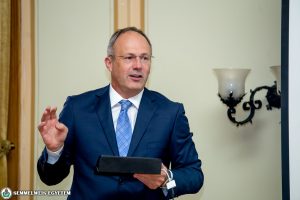 “My programme proposal is divided into two parts. On the one hand, it deals with how mankind could be globally healthier, and on the other hand how WHO as the UN specified agency in health matters providing technical assistance to its member states could enforce this endeavour. The two parts are connected, since 80 % of the income of WHO comes from voluntary contributions and in case the world organization could be accused of not being prepared enough, for example for epidemics, it could also endanger the stability of its income. One of the top priorities of my programme is the proactive preparations for epidemics, possible new world pandemics. As I see, one of the hottest topics is to calm the world’s population after Ebola and Zika epidemics. Of course, the nation-states have an essential responsibility, yet WHO has a relevant coordinating role and it has to track down whether the required resources are globally available or not. Nowadays, due to the speed-up of travelling everything is interconnected worldwide, thus it is a common aim to continuously ensure an institutionalized resource for risk management.”, expressed Dr. Szócska during the introduction of his programme.
“My programme proposal is divided into two parts. On the one hand, it deals with how mankind could be globally healthier, and on the other hand how WHO as the UN specified agency in health matters providing technical assistance to its member states could enforce this endeavour. The two parts are connected, since 80 % of the income of WHO comes from voluntary contributions and in case the world organization could be accused of not being prepared enough, for example for epidemics, it could also endanger the stability of its income. One of the top priorities of my programme is the proactive preparations for epidemics, possible new world pandemics. As I see, one of the hottest topics is to calm the world’s population after Ebola and Zika epidemics. Of course, the nation-states have an essential responsibility, yet WHO has a relevant coordinating role and it has to track down whether the required resources are globally available or not. Nowadays, due to the speed-up of travelling everything is interconnected worldwide, thus it is a common aim to continuously ensure an institutionalized resource for risk management.”, expressed Dr. Szócska during the introduction of his programme.
According to Dr. Szócska, one of the largest problems that endanger health is climate change, along which new diseases and new types of epidemics can emerge. Further to health security challenges, the second largest problem is health-related irresponsible human behaviour. As he described, even in low income or middle income countries it is not infectious diseases that lead the statistics on causes of death. Nutritional habits also contribute to this, similarly as global advertisements promoting unhealthy products, weaknesses in the prudent use of antibiotics and such business models that prefer short-term profits to long-term interests.
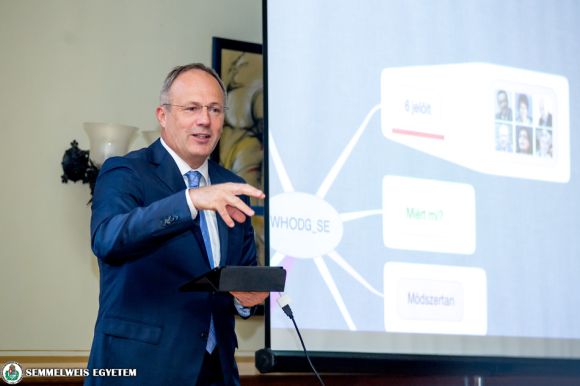 In his proposed programme, Dr. Szócska also emphasized the importance of the recognition, acceptance and implementation of the concept of universal health coverage. This could be supported by already available technological development such as e-health solutions, mobile health care devices and point-of care technologies with the help of which health care could be available for people at places where it had not been accessible before. Dr. Szócska made note of the expansion of the public health product tax, which was already introduced while he had been Minister of State for Health between 2010-2014. This could be a possible tool for global resource generation.
In his proposed programme, Dr. Szócska also emphasized the importance of the recognition, acceptance and implementation of the concept of universal health coverage. This could be supported by already available technological development such as e-health solutions, mobile health care devices and point-of care technologies with the help of which health care could be available for people at places where it had not been accessible before. Dr. Szócska made note of the expansion of the public health product tax, which was already introduced while he had been Minister of State for Health between 2010-2014. This could be a possible tool for global resource generation.
“In parallel, there is a great need for a reform of efficiency in the structural operation of WHO. The role of the world organization, which is the agent of changes, has to be reinforced as the unquestionable, unbiased and independent leader of global health. The future director-general must undertake the narrowing of differences between theoretical solutions and practical realization, and as regards the organization, flexibility as well as building on partnerships have to be strengthened. WHO also needs to operate as a centre of knowledge as well as of setting norms and standards, which can provide assistance to member states with international examples in questions related to health. Health has to become a global political, economic and financial priority.”, said Dr. Szócska.
The World Health Assembly will be electing WHO’s new director-general next May, and until then the candidates have to participate in several events. Dr. Szócska said that his first campaign activity was in Manila in mid-October, where the candidates introduced their programmes during the regional committee meeting of the Western Pacific Region. The next step was a web forum for WHO member states being held during the last week of October, which was followed by an audition in Geneva on November 1-2, during which the candidates introduced their programmes in a random order decided by a draw in front of the representatives of member states. The following day the candidates continued the competition in London at the debate forum of Lancet Chatam House. The list of candidates will be narrowed down first to five, then to three at the beginning of next year, then later in May the World Health Assembly will take its final decision, where all 194 member states have the right to vote.
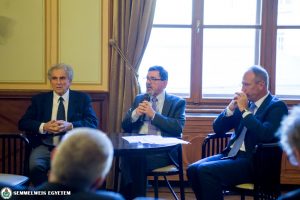 Prior to the upcoming qualifications, Dr. Szócska presented his programme in the framework of an interactive consultation at Semmelweis University. The event was opened by Rector Szél, who emphasized that prior to the official campaign it was important to have an opportunity for the exchange of ideas in the course of which Dr. Szócska could also present the major elements of his programme. On the other hand, he can receive ideas, thoughts and munition from the leading professors of the university. The event was moderated by Dr. Miklós Réthelyi rector emeritus, who started his speech by quoting from an interview with the candidate which was published in the Lancet. In this interview, Dr. Szócska spoke among others about the fact that technical changes are not enough if the methodology of consultative change management is not available. As Dr. Réthelyi pointed out, Dr. Szócska has represented the need for change in all of his prior positions, however, never as a directive in itself, but placed in the appropriate environment. The rector, the chancellor and several rectors emeritus, vice rectors, deans and heads of departments of the university participated in the consultation in the course of which several constructive proposals and opinions were expressed.
Prior to the upcoming qualifications, Dr. Szócska presented his programme in the framework of an interactive consultation at Semmelweis University. The event was opened by Rector Szél, who emphasized that prior to the official campaign it was important to have an opportunity for the exchange of ideas in the course of which Dr. Szócska could also present the major elements of his programme. On the other hand, he can receive ideas, thoughts and munition from the leading professors of the university. The event was moderated by Dr. Miklós Réthelyi rector emeritus, who started his speech by quoting from an interview with the candidate which was published in the Lancet. In this interview, Dr. Szócska spoke among others about the fact that technical changes are not enough if the methodology of consultative change management is not available. As Dr. Réthelyi pointed out, Dr. Szócska has represented the need for change in all of his prior positions, however, never as a directive in itself, but placed in the appropriate environment. The rector, the chancellor and several rectors emeritus, vice rectors, deans and heads of departments of the university participated in the consultation in the course of which several constructive proposals and opinions were expressed.
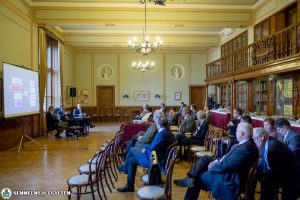 A total of six candidates are competing for the post of director-general of WHO. Besides Dr. Miklós Szócska the other candiates are: Dr. Tedros Adhanom Ghebreyesus (Ethiopia), Dr. Flavia Bustreo (Italy), Dr. Philippe Douste-Blazy (France), Dr. David Nabarro (United Kingdom), Dr. Sania Nishtar (Pakistan).
A total of six candidates are competing for the post of director-general of WHO. Besides Dr. Miklós Szócska the other candiates are: Dr. Tedros Adhanom Ghebreyesus (Ethiopia), Dr. Flavia Bustreo (Italy), Dr. Philippe Douste-Blazy (France), Dr. David Nabarro (United Kingdom), Dr. Sania Nishtar (Pakistan).
Regarding his chances to be elected, Dr. Szócska expressed that he intends to form the agenda of the global fight for health during the candidacy procedure, yet the final decision will be influenced by sensitive diplomatic and international processes as well. Dr.Szócska emphasized that he is already honoured to be nominated and to be able to participate in the candidacy procedure.
Pálma Dobozi
Photo: Attila Kovács, Semmelweis University
Translated by: Katalin Romhányi
